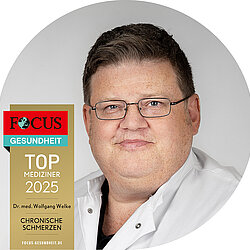Many patients who visit our pain clinic with nerve root pain have undergone spinal surgery in the past. After the operation, scarring occurred in the spinal canal, leading to so-called scar pain in those affected.
The adhesions make the nerve roots almost immobile and impair blood circulation. This results in chronic nerve pain. In addition to scarring, inflammatory changes in the spinal canal, narrowing of the spinal canal and constriction of emerging spinal nerves due to disc displacement can also lead to pain.
How is nerve root pain treated?
Epiduroscopy is a procedure used at the Sportklinik Hellersenfor nerve root pain that allows these scarred structures to be visualized and mechanically reduced. Our pain specialists treat the nerve roots using a radio frequency probe and a balloon dilator (special catheter) to widen the constrictions. In this way, the constricted nerves are given more space again. State-of-the-art flexible endoscopes with up to three working channels (rhesascope, surgical endoscope) and a diameter of 2.8 millimetres are used. The patient is asleep during the procedure, but does not require general anesthesia, meaning that this minimally invasive method is also regularly used in older people and is less stressful.
Other treatment options for nerve root pain
Another treatment method is epidural catheter pain therapy. Neuromodulation procedures are used to block the transmission of pain via the nerves to the brain. This is possible by infusing painkillers via epidural or spinal pain catheters or by applying high-frequency current via electrodes in the spinal canal. Modulation of pain transmission and inhibition can be achieved at spinal cord level. The procedure is largely pain-free.
Multimodal pain therapy and neuromodulation for nerve root pain
In our pain clinic, we also offer a wide range of multimodal therapy procedures. If these reach their limits, neuromodulation procedures can help and lead to pain relief. Neurostimulators, so-called pain pacemakers, generate a weak electrical field in the spinal canal, which blocks pain transmission at spinal cord level without affecting motor function (movement): Depending on the procedure, the patient either feels a pleasant tingling sensation in the area of pain or simply pain relief without any perception of tingling (high frequency).
The medication pump
By implanting medication pumps, our specialists can also administer strong painkillers directly into the cerebrospinal fluid. The drug pump is implanted directly under the skin. The substances reach the pain switch points of the central nervous system directly via the cerebrospinal fluid (which protects the brain and spinal cord like a water cushion). The advantage: the amount of painkiller can be reduced. For example, an opioid dose can be reduced by a factor of 150 if it is administered via the cerebrospinal fluid, i.e. 1 mg morphine from the pump corresponds to 150 mg morphine in tablet form. Due to the much smaller amount, the pain medication is usually tolerated much better.








